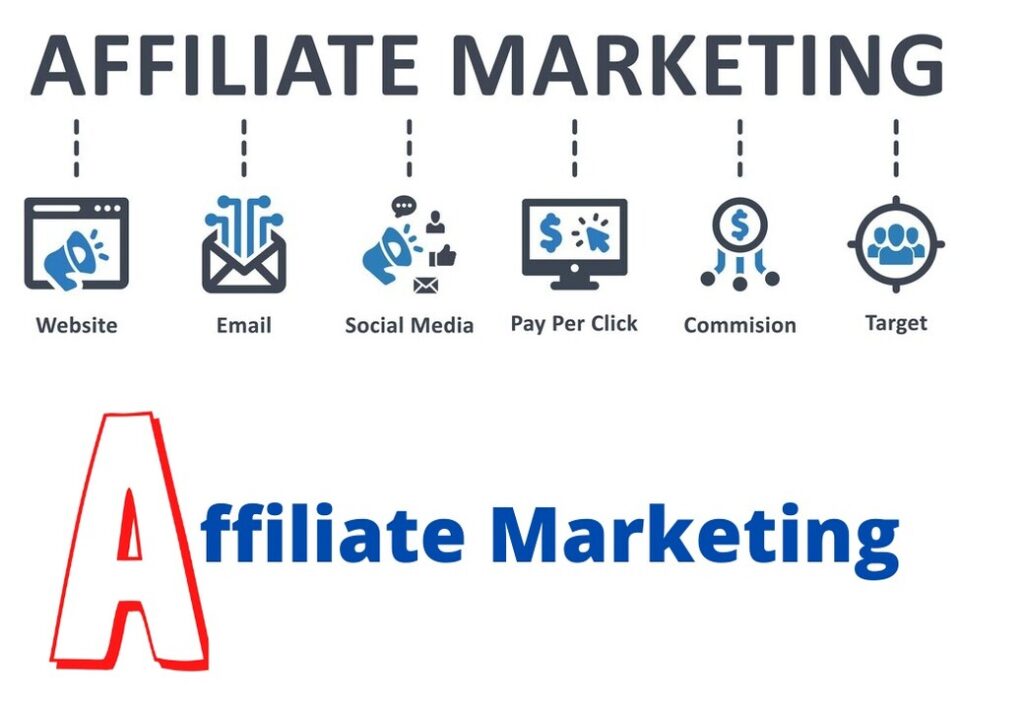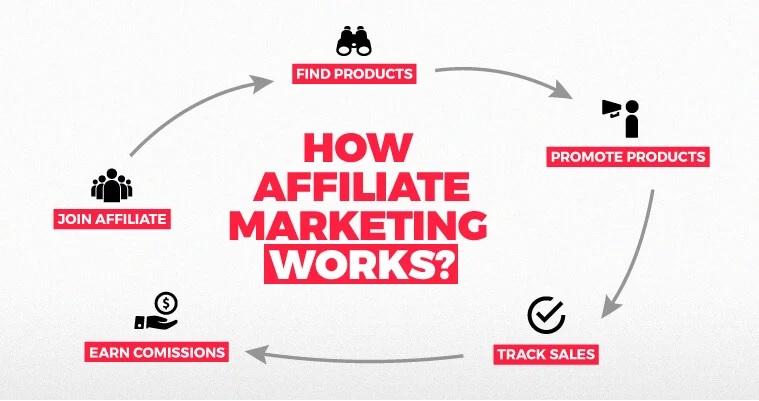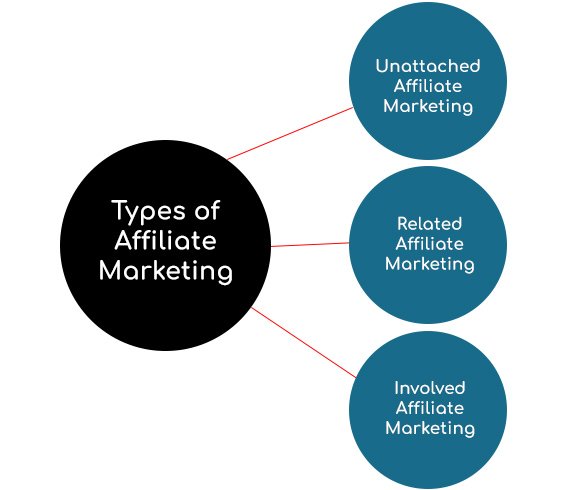
Affiliate marketing is a performance-based marketing strategy where brands or businesses partner with affiliates (publishers or influencers) to promote their products or services. In affiliate marketing, the affiliate earns a commission for each sale, lead, or action generated through their promotional efforts. It is the process by which an affiliate earns a commission for marketing another person’s or company’s products. The affiliate simply searches for a product they enjoy, then promotes that product and earns a piece of the profit from each sale they make. The sales are tracked via affiliate links from one website to another.

Affiliate marketing starts when an affiliate joins a program and receives a unique link to promote. When a customer clicks this link and makes a purchase, the affiliate system records it, and the affiliate earns a commission. Because affiliate marketing works by spreading the responsibilities of product marketing and creation across parties. It leverages the abilities of a variety of individuals for a more effective marketing strategy while providing contributors with a share of the profit. So, Here are some steps to do affiliate marketing:
Adding affiliate links to your online platforms involves strategically placing these links in strategic locations to encourage clicks and drive traffic to the products or services you’re promoting. Share affiliate links on your social media profiles, such as Facebook, Instagram, Twitter, Pinterest, or LinkedIn. Craft engaging posts or captions that highlight the benefits or features of the products or services you’re promoting.
Mention and display affiliate links in your YouTube videos, particularly in product reviews, unboxing videos, tutorials, or shopping hauls. Include clickable links in the video description box. And If you use YouTube’s built-in cards and end screens to direct viewers to the products or services you’re promoting so it can generate traffic.
As you start to bring visitors to your content, some of the users will click your affiliate links. When they do, your affiliate links will create tracking cookies in the user’s browser. These are what allow the merchant to tell which (if any) affiliate helps bring in the customer.
Upon clicking the affiliate link, a tracking cookie or tracking code is activated. This tracking mechanism allows the brand to identify and attribute the referral to the specific affiliate who generated the click.
By clicking on the affiliate link, the customer initiates a chain of events that ultimately results in the affiliate earning. A commission for driving the referral to the brand’s website and facilitating a conversion.
After the customer clicks your link, they will be taken to the merchant’s website.
The type of page that they land on will depend on the business’ particular offering.
It may also be determined by your choice as some programs give affiliates multiple landing pages to choose from.
While on the page the customer will review the product to learn more about it.
Once they have time to weigh their decision, some of the people who land on the merchant’s website will choose to complete their purchase. There may be others who do not buy right away but eventually come back to complete their purchase.
When the customer places their order, the affiliate tracking system will record all the details for the purchase.
It will also look to see which affiliate should be credited with the sale.
In a situation where the customer only clicked one affiliate link, this is easy to determine.
Things get more tricky if the customer clicked multiple links before buying. Affiliate programs use different attribution models to decide who gets the sale. A common attribution model is a last-click model.
With this model, whoever’s link was clicked most recently gets the sale. It is also common for programs to use a first-click model. where the first affiliate that gets the person to the merchant site is credited.
There is not just one way from which brands associate with affiliates. In fact, there are three key types of affiliate marketing engagements that you can for:

When the affiliate is not present in any niche or has no authority in the particular advertising area to promote the product, that’s what you call unattached affiliate marketing. In this, an affiliate marketer can simply launch ads on Google Ads or Facebook ads. Unattached affiliate marketing, also known as “cookie stuffing” or “cookie dropping,” is a controversial and unethical practice that involves placing affiliate tracking cookies on website visitors’ browsers without their knowledge or consent. This practice aims to fraudulently claim commissions for affiliate referrals, even if the user did not intentionally click on an affiliate link or make a purchase through the affiliate’s promotional efforts.
Related affiliate marketing involves promoting products or services that are closely aligned with the content, theme, or audience interests of a particular online platform or marketing channel. Unlike unattached affiliate marketing, which relies on deceptive tactics to generate commissions, related affiliate marketing focuses on creating genuine connections between the promoted offerings and the audience’s needs, preferences, and interests.
For example, perhaps you’re promoting a clothing brand you’ve never used before, but you have an audience through a fashion blog or YouTube channel. In this case, you would be considered a related affiliate marketer.
Involved affiliate marketing refers to a collaborative approach between merchants, affiliates, and consumers. Where all parties actively participate in the affiliate marketing ecosystem with transparency, integrity, and mutual benefit. Unlike unethical practices such as unattached affiliate marketing, involved affiliate marketing emphasizes genuine engagement, authentic relationships, and value creation for all stakeholders.
Rather than relying on pays per click, involved affiliate marketers use their personal experiences with the product in their marketing efforts, and customers can trust them as reliable sources of information.
Finding the right affiliates for your brand involves identifying individuals or entities who align with your brand values, target audience, and marketing objectives. So, here are some most common types of affiliate channels you will find.

You may have come across a bunch of blog posts that say ‘Best Hosting of the Year’. Most bloggers who write this type of piece often have an affiliate marketing agenda in it. The reason is, that bloggers have their hands-on SEO and know how to entice the audience to buy a thing through the power of words.
This is why bloggers come up with the finest and most compelling reviews or listicles about the products in the marketing and involve the audience to complete certain tasks. As a reward, they get paid for their true words.

Having a website is a great way to promote your products. Sometimes, the marketer may have a large media website that has a fanbase of millions on its online publications. This is just right for someone who wants to reach out to as many people as possible.
Mostly, these large website operators have a huge email list on which they can share information that usually includes an affiliate hyperlink. These emails usually include newsletters with a bunch of CTAs. You know how far these affiliate links can reach and your sales will be flying higher.

We generally don’t think about influencers when it comes to affiliate marketing, but this is one great way to leverage your sales. Imagine, an influencer probably has a number of followers on his/her account. And when they recommend your product, you can increase your sales way too much.
Again, influencers do a great job as affiliate marketers because they have a fanbase and a large audience who trust their words of mouth. Even if they promote the product via blog posts, social media posts, or whatever way they do, your product would reach out to people who are just right for you.
Knowing types of affiliate marketing channels is good and all but do you have any idea how to pick the right one? This decision involves a series of decision-making.
Affiliate marketing allows individuals to benefit from the sales of products and services without having to spend any money upfront. A publisher simply promotes products among their audience and earns revenue share when they buy something through that affiliate’s links. If you want to be succeeded in affiliate marketing then their are some steps you may follow:
Choose the right niche or industry that aligns with your interests, expertise, and audience preferences. Focus on a specific niche where you can provide value, stand out from competitors, and establish yourself as an authority.
Select Quality products or services that you genuinely believe in and would recommend to your audience. Partner with reputable merchants or affiliate programs that offer high-quality products or services that appeal to your target audience.
Produce high-quality content that resonates with your audience and aligns with your affiliate marketing goals. Incorporate affiliate links naturally within your content, such as product reviews, recommendations, tutorials, or round-up posts. And provide genuine insights and recommendations to your audience.
With high-commission products, you can earn a solid payout for each of your sales or leads. Naturally, you want to sell products that reward you well for your efforts.
The most profitable commissions are recurring commissions. These not only give you a source of passive income, but the sums of money they accumulate can add up rapidly.

An affiliate marketer is a person who promotes someone else’s products in exchange for a commission. Affiliate marketers act as intermediaries between merchants and consumers, leveraging their online presence, marketing skills, and audience reach to generate revenue through affiliate marketing partnerships. They are often a content producer that has an audience that they can use to share the company’s products.
Most affiliate programs provide affiliates with access to tracking tools and analytics platforms to monitor performance metrics such as clicks, conversions, sales, commissions, and earnings. Affiliates can use these insights to evaluate the effectiveness of their marketing campaigns and optimize their strategies for better results.
Affiliate marketing programs are the in-house systems used by merchants to run and manage their affiliate marketing strategy. The foundation of any affiliate marketing program is the arrangement between the merchant and its affiliate. In the arrangement, affiliate merchants and marketers come to terms with the specific details of their working relationship. This includes what qualifies for commissions, how commissions are paid, how the affiliate is allowed to promote the products, and more.
While having a website can be advantageous for affiliate marketing, it’s not always necessary. Affiliates can promote products or services through various channels, including social media, email marketing, YouTube, podcasts, forums, or content platforms like Medium or Quora. However, a website provides a centralized hub for your content and affiliate promotions.
An affiliate merchant engages in the second type of affiliate marketing. They create an affiliate program along with their own products to be marketed in the program. They then find affiliates to join the program and begin promoting their items. An affiliate merchant, also known simply as a merchant or advertiser, is a business or company that sells products or services and participates in an affiliate marketing program.

Talk to our experts who can guide you from choosing the right course, which will help to become successful in your Career.
Join our ONE free Class Now and Decide Yourself.

Unit of Global EduCareer Solutions.
B – 1/628, 2nd Floor, JanakPuri
Delhi – 110058
Opp. Metro Pillar No. 570
All Rights Reserved to GICT Since 2008

Unit of Global EduCareer Solutions.
B – 1/628, 2nd Floor, JanakPuri
Delhi – 110058
Opp. Metro Pillar No. 570
All Rights Reserved to GICT Since 2008